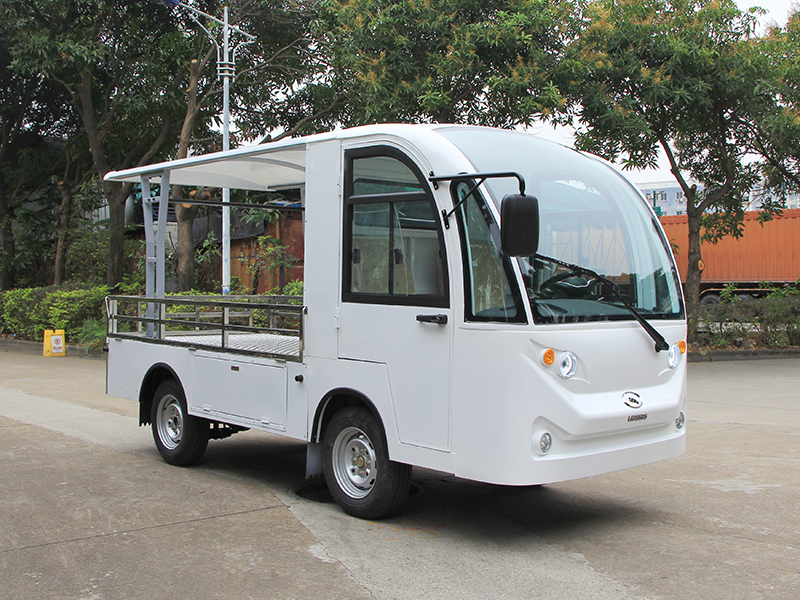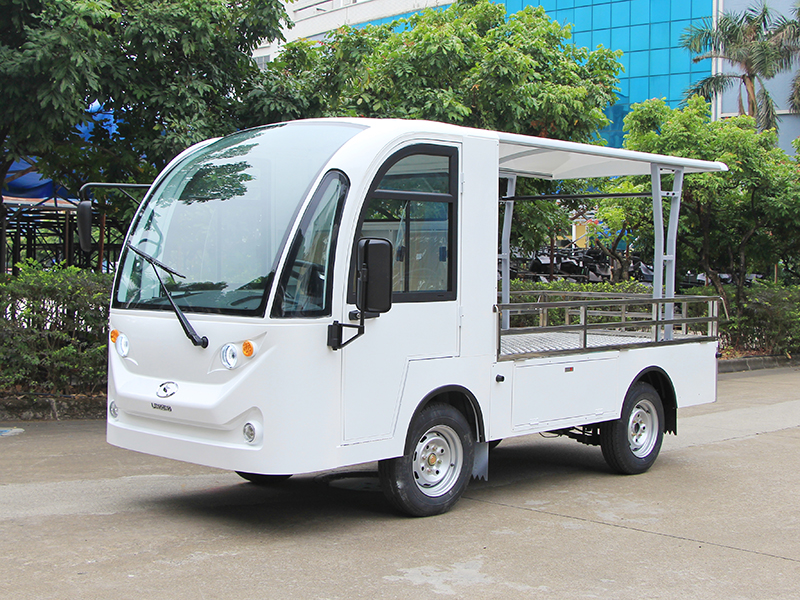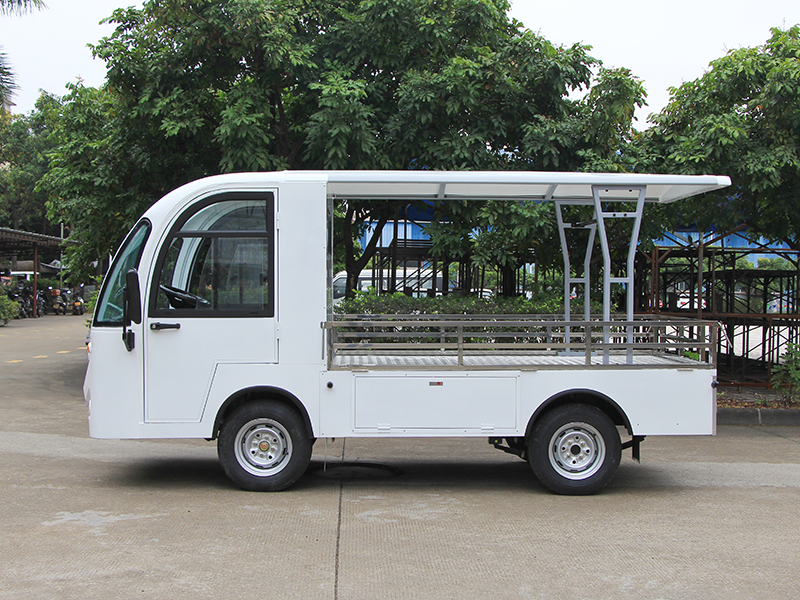Content Menu
● Introduction
● Swiss Electric Cargo Vehicle Industry Overview
● Leading Electric Cargo Vehicle Manufacturers and Suppliers
>> Flux Mobility
>> KYBURZ Switzerland AG
>> Designwerk Technologies AG
>> Centaur Cargo Switzerland
>> Mercedes-Benz Trucks Switzerland (eActros)
>> JAC Switzerland
● Innovations and Emerging Technology Trends
>> Battery Technology & Vehicle Range
>> Smart Customization and Modularity
>> Sustainable Manufacturing and Supply Chain Practices
>> Intelligent Fleet Management and Digital Integration
>> Expansion of Charging Infrastructure
● Market Drivers and Challenges
>> Key Growth Drivers
>> Principal Challenges
● The Role of Charging Infrastructure in Switzerland
● CASE STUDIES: Swiss Electric Cargo Fleets in Action
>> Camion Transport & eActros
>> Migros Supermarket Distribution
>> KYBURZ DXP with Swiss Post
>> DPD Switzerland: Smart Charging Initiatives
● Conclusion
● Frequently Asked Questions (FAQ)
>> 1. What are the main benefits of switching to electric cargo vehicles in Switzerland?
>> 2. How do Swiss charging infrastructures support cargo EV fleets?
>> 3. Are Swiss-manufactured electric cargo vehicles suitable for mountainous terrain?
>> 4. Who are the leading suppliers of electric cargo vehicles in Switzerland?
>> 5. What financial incentives exist for companies adopting electric cargo vehicles in Switzerland?
Introduction
Switzerland stands as a leading hub for technological innovation and environmental sustainability, especially in the burgeoning electric vehicle sector. Demand for electric cargo vehicles has soared, creating a dynamic market powered by both established international players and pioneering local manufacturers. In this comprehensive guide, we explore the landscape of Switzerland's Electric Cargo Vehicle Manufacturers and Suppliers, highlighting key companies, market trends, technological innovations, and the increasing role of sustainable mobility. This detailed analysis reveals how Swiss industry leaders are shaping the future of cargo transportation with eco-friendly solutions designed for efficiency, reliability, and adaptability.

Swiss Electric Cargo Vehicle Industry Overview
The market for electric cargo vehicles in Switzerland has experienced unprecedented growth over recent years and continues to expand rapidly in 2025. This surge is propelled by a blend of governmental eco-policies, brisk adoption by freight and logistics companies, and increasing consumer awareness about sustainability. National programs encourage clean technology investments through subsidies, tax reductions, and research support for vehicle innovation and battery development.
Switzerland's unique geography—with its combination of dense urban centers and mountainous rural corridors—demands electric cargo vehicles that offer both agility and power. Swiss manufacturers have risen to the challenge by delivering vehicles that blend robust performance with low environmental impact. These vehicles address the critical need to reduce carbon emissions in urban zones, improve air quality, and overhaul traditional fossil-fuel-based delivery fleets.
The nationwide shift to electrification aligns with Switzerland's ambitious climate goals aimed at becoming carbon neutral by 2050. Consequently, the electric cargo vehicle segment has evolved into a crucial pillar of Switzerland's transportation and logistics ecosystem, exemplifying the country's commitment to sustainable industrial transformation.
Leading Electric Cargo Vehicle Manufacturers and Suppliers
Flux Mobility
Situated in Winterthur, Flux Mobility offers a standout range of light electric commercial vehicles that cater to a broad spectrum of cargo needs. Their vehicles are designed to replace diesel vans with minimal disruption while providing superior payload and towing capacities, addressing logistical challenges faced by urban and rural operators alike. This Swiss company emphasizes modularity, allowing clients to switch between cargo boxes, refrigerated units, or flatbeds on a single chassis—a feature that enhances fleet versatility.
Flux's dedication to Swiss-made quality and local assembly ensures rigorous standards and quick turnaround times. Their vehicles incorporate all-wheel-drive systems, cutting-edge battery management, and IoT-enabled fleet monitoring, positioning Flux as a top-tier choice for companies prioritizing reliability fused with innovation.
KYBURZ Switzerland AG
KYBURZ Switzerland AG holds a prominent place in the Swiss market for its focus on efficient, urban-centric electric vehicles tailored to postal services and last-mile delivery. Its DXP model is particularly favored by Swiss Post, highlighting the trust public entities place in KYBURZ's products. With ergonomic design, low operational costs, and smooth drivability, KYBURZ vehicles effectively meet the logistical demands of densely populated European cities.
Beyond cars, KYBURZ pioneers the use of electric cargo bikes—a nimble alternative for congested streets and pedestrian zones—offering zero-emission delivery options that reduce delivery time and traffic congestion simultaneously. Their solution suite reflects a forward-thinking approach to combining sustainability with practicality.
Designwerk Technologies AG
Designwerk Technologies AG steps into the realm of heavy-duty electric cargo vehicles with pioneering technology that targets long-haul freight operators. The company has earned global attention for creating the first all-electric semi-trailer truck powered by a massive 1,000kWh battery pack. This breakthrough enables electric trucks to deliver performance on par with diesel counterparts over extended distances.
Their vehicles incorporate modular battery systems, which provide clients with scalable options tailored to route specifics and payloads. Designwerk's emphasis on sustainability extends to integrating charging systems that support rapid recharging and bidirectional power flow—a significant advancement for grid integration and operational efficiency.
Centaur Cargo Switzerland
Centaur Cargo specializes in durable, practical electric cargo vehicles suited for urban and regional deliveries. Its vehicles strike a balance between affordability and functionality, offering Swiss clients reliable options without compromising on performance or environmental sustainability. Centaur's growing reputation in the market underscores the demand for competitive electric cargo options beyond niche or luxury offerings.
Mercedes-Benz Trucks Switzerland (eActros)
The Swiss division of Mercedes-Benz trucks champions the eActros, an electric cargo truck tailored for emission-free urban delivery. Collaborations with logistics leaders like Camion Transport and Migros have amplified the eActros's presence across Swiss cities. These vehicles offer a range upwards of 200km per day under realistic load conditions and feature specialized configurations optimized for sensitive goods such as chilled and frozen products.
Mercedes-Benz's Swiss teams continually optimize the eActros to meet the exacting Swiss standards and operational realities, making this model a benchmark for electric cabin trucks in Europe.
JAC Switzerland
JAC Switzerland delivers economically attractive electric cargo vans with models such as the JAC M3EV, ideal for enterprises seeking cost-effective, practical solutions for local delivery and SME logistics. Although newer to the Swiss market, JAC's affordable pricing and dependable performance are gaining traction quickly among small- to mid-sized companies aiming to upgrade their fleets affordably.
Innovations and Emerging Technology Trends
Battery Technology & Vehicle Range
Given the mixed geography of Switzerland, battery performance is critical. Manufacturers are pushing boundaries to develop cell chemistries and battery architectures that improve energy density, charging cycles, and thermal management. Today's batteries enable electric cargo vehicles to exceed 200km per charge in typical use cases, addressing range anxiety prevalent in commercial operations.
The rise of ultra-large battery packs—like Designwerk's 1,000kWh system—signals a shift towards electrification of heavy freight routes traditionally reliant on diesel trucks. These designs include modular batteries that operators can swap or upgrade, providing flexibility that reduces total cost of ownership.
Energy regeneration technologies, including regenerative braking and smart energy management, further support vehicle efficiency, especially in hilly terrain. Manufacturers continuously refine software algorithms to maximize energy recovery and extend operational range, crucial for maintaining productivity in challenging Swiss topography.
Smart Customization and Modularity
A defining feature of Swiss Electric Cargo Vehicle Manufacturers and Suppliers is the emphasis on modular design principles. Companies like Flux Mobility offer platforms customizable to a customer's specific shipment requirements—ranging from refrigerated containers for perishable goods to flatbed configurations for construction or municipal equipment.
Such adaptability means fleet operators can diversify deliveries without purchasing multiple vehicle types, facilitating cost savings and operational flexibility. Modular systems also allow easier maintenance and component upgrades, enhancing vehicle lifespans and reducing downtime.

Sustainable Manufacturing and Supply Chain Practices
Swiss manufacturers underscore commitment to sustainability beyond just the vehicles, embedding responsible practices throughout production. This includes locally sourced materials, energy-efficient factories powered by renewable energy, and circular economy principles such as vehicle parts recycling and battery reuse programs.
Efforts to minimize carbon footprints extend into logistics and supplier collaborations, reinforcing Switzerland's high environmental standards and reputation for precision engineering with ecological responsibility.
Intelligent Fleet Management and Digital Integration
Adoption of digital telematics and fleet management tools has surged, empowering businesses with data-driven insights on route optimization, vehicle health monitoring, driver behavior, and battery usage patterns. These smart solutions enable dynamic scheduling that reduces unnecessary mileage and maximizes battery life, key for cost-effective EV fleet operation.
Many suppliers offer integrated software packages with real-time diagnostics, predictive maintenance alerts, and centralized control dashboards. This level of connectivity enhances decision-making, helping customers achieve sustainability targets while improving profitability.
Expansion of Charging Infrastructure
The expansion of Switzerland's electric vehicle charging network is a fundamental enabler of cargo EV adoption. Prominent energy companies and tech firms collaborate to deploy fast-charging stations across urban centers, regional hubs, and strategic highways.
Public-private partnerships bolster installation of DC fast chargers capable of replenishing vehicles quickly—often within an hour—minimizing operational delays. Projects implementing bidirectional (vehicle-to-grid) charging are on the rise, allowing cargo fleets to not only draw electric power but also feed electricity back to the grid during peak demand, supporting overall energy stability.
This robust infrastructure foundation reduces one of the main barriers for commercial EV uptake, ensuring seamless integration into existing logistics workflows.
Market Drivers and Challenges
Key Growth Drivers
- Stringent Emission Regulations: Compliance with Switzerland's strict climate policies and EU directives require logistics companies to accelerate electrification.
- Government Incentives: Comprehensive financial support—subsidies, tax breaks, and preferential leases—make electric cargo vehicle acquisition more attractive.
- Rising Corporate Sustainability Commitments: Multinational and local firms increasingly set carbon-neutrality goals impacting fleet decisions.
- Urbanization and E-Commerce Expansion: Heightened demand for last-mile delivery solutions fosters electric cargo vehicle market growth.
Principal Challenges
- Upfront Investment Costs: Initial purchase prices for electric cargo vehicles and charging infrastructure remain considerable compared to diesel alternatives.
- Infrastructure Gaps: Although improving, rural and mountainous areas may still face charging accessibility constraints.
- Payload and Range Limitations: Despite advances, battery weight and range still pose challenges for very heavy freight or long-distance requirements.
- Workforce Adaptation: Transitioning requires driver training, technical upskilling, and logistics planning re-engineering.
The Role of Charging Infrastructure in Switzerland
For electric cargo vehicles, the charging ecosystem is the linchpin determining operational viability. Switzerland's advancement in scalable charging solutions, especially DC fast-charging networks, supports the demands of intensive commercial usage.
Consumers and fleet managers benefit from convenient charging access via apps that provide real-time station status, reservation capabilities, and streamlined billing. Corporations often integrate charging within depot facilities, customizing solutions for their fleet size and usage schedules.
In addition to fixed infrastructure, mobile and flexible charging units are being tested, extending operational reach for deliveries beyond urban centers. The public and private sectors continue to collaborate on enhancing interoperability between various charging networks, ensuring Swiss fleets encounter minimal downtime and maximum flexibility.
CASE STUDIES: Swiss Electric Cargo Fleets in Action
Camion Transport & eActros
Camion Transport's adoption of Mercedes-Benz eActros trucks illustrates practical benefits achievable today. Operating in urban Zurich and other cities, these vehicles address environmental, noise pollution, and logistical concerns inherent in dense delivery zones. The trucks operate on sustainable electric power enabling daily routes of up to 200km, backing Switzerland's clean energy commitments.
Migros Supermarket Distribution
Migros, Switzerland's largest retailer, actively electrifies its distribution operations with eActros vehicles configured for chilling capabilities, ensuring food safety and freshness alongside emission reductions. Migros's pioneering efforts demonstrate how large retail supply chains can transition fleets effectively without sacrificing service quality.
KYBURZ DXP with Swiss Post
KYBURZ's DXP cargo vehicles have transformed postal delivery with improved reliability, cost-efficiency, and emissions reduction. Swiss Post's embrace of these electric vans underscores confidence in the technology for demanding day-to-day logistics operations in challenging urban environments.
DPD Switzerland: Smart Charging Initiatives
DPD Switzerland exemplifies innovation by piloting bidirectional charging technologies, enabling their EV fleet to support power grid stability through dynamic energy exchange during peak times while reducing operational energy costs.
Conclusion
Switzerland's Electric Cargo Vehicle Manufacturers and Suppliers are leading a transformation in commercial transport by delivering cutting-edge, sustainable solutions tailored for the country's unique geographical and regulatory environment. This vibrant sector blends technical innovation, environmental responsibility, and smart business practices to create electric cargo vehicles adept at diverse logistical challenges—from last-mile urban deliveries to heavy-duty freight operations.
Supported by expanding charging infrastructure and strong government policy, Swiss manufacturers and suppliers continue to refine their offerings, making electric cargo vehicles increasingly accessible and viable for a broad spectrum of customers. As more companies adopt these green technologies, Switzerland sets a compelling example of how economic growth and environmental stewardship can advance hand in hand.

Frequently Asked Questions (FAQ)
1. What are the main benefits of switching to electric cargo vehicles in Switzerland?
Electric Cargo Vehicle Manufacturers and Suppliers provide solutions that reduce greenhouse gas emissions, lower operational and maintenance costs, and ensure compliance with stringent environmental regulations. Electric cargo vehicles offer quieter operation, improving urban livability, while enhancing corporate sustainability credentials and benefiting from government incentives.
2. How do Swiss charging infrastructures support cargo EV fleets?
Switzerland offers a comprehensive network of fast-charging stations equipped with scalable capabilities to service commercial fleets efficiently. Integrated payment and app-based station location services allow fleet managers to plan routes effectively, drastically reducing vehicle downtime. Innovations such as bidirectional charging also enhance energy optimization for businesses.
3. Are Swiss-manufactured electric cargo vehicles suitable for mountainous terrain?
Yes, they are specifically engineered for Swiss topography. Features including all-wheel drive, well-calibrated regenerative braking, high-torque electric motors, and robust battery thermal management enable safe, efficient performance on steep gradients, sharp turns, and varying altitudes.
4. Who are the leading suppliers of electric cargo vehicles in Switzerland?
Notable Electric Cargo Vehicle Manufacturers and Suppliers include Flux Mobility, KYBURZ Switzerland AG, Designwerk Technologies AG, Centaur Cargo Switzerland, Mercedes-Benz Trucks Switzerland (eActros), and JAC Switzerland. These manufacturers offer a range of models tailored for diverse cargo transport scenarios and urban logistics needs.
5. What financial incentives exist for companies adopting electric cargo vehicles in Switzerland?
The Swiss federal and cantonal governments provide a variety of incentives such as grants, tax deductions, and subsidies specifically aimed at offsetting vehicle purchase costs, charging infrastructure installation, and operational transition expenses. These incentives significantly reduce the total cost of ownership, accelerating fleet electrification.




















































